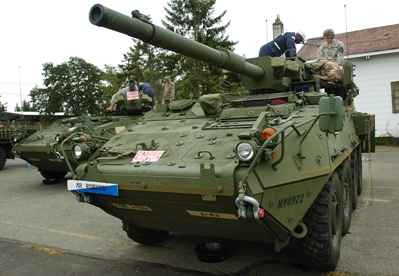
A long wait is over for Stryker Mobile Gun System (MSG) crews of the 4th Brigade, 2nd Infantry Division.
The 2nd Battalion, 23rd Infantry, received its complement of MGS vehicles last month after more than a year of waiting. They are the first vehicles to be fielded in the Army.
“I think its going to give the infantry a whole new dimension of what they can do. Armor and infantry have kept each other at arm’s length for years and years," said Sgt. 1st Class David Cooper, an MGS platoon sergeant with B Company, 2-23 Inf. "We’ve got some growing pains, but once we get out there and they see what we can do, we’re going to be everybody’s friend.”
Each infantry company is slated to receive three vehicles, though crews don't expect to operate together except on rare occasions.
The vehicles carry crews of three, and are equipped with a 105 mm main gun and a state-of-the-art fire control system. The MGS also has an onboard coaxial machine gun that’s fire controlled.
“You can literally shoot smiley faces with it at 900 meters,” said Cooper. “Even minus the big gun we can give the infantry a lot of support.”
The 105 mm is capable of firing four types of rounds: SABOT, a depleted-uranium armor-piercing round; HEAT, high-explosive anti-tank; HEP, high-explosive plastic; and a canister round. The rounds are loaded using a hydraulic auto-loader in the rear of the vehicle.
The HEP and canister rounds give Stryker units new capabilities, especially in urban areas. The HEP can blow holes in reinforced concrete walls, but unlike the rounds from an Abrams, won’t continue through the target and into surrounding buildings. The canister provides as effective anti-personnel capability.
“The vehicle’s basic role is to support the infantry. It’s not there to take on tanks or go toe-to-toe in the wide-open desert like we did with the Abrams,” said Sgt. 1st Class William Ozmet, an MGS instructor from Fort Knox, Ky. “Its primary function is blowing a hole in the wall or blowing up bunkers.”
Over the past year, the crews have been training with TOW-ITAS Humvees or other Stryker variants. Finally having the vehicles gives the crews a chance to delve into training.
“I can actually start focusing on our training, both on our mission tasks and working with the infantry,” said 1st Lt. Christopher Lilley, the MGS platoon leader in B Co.
The MGS also comes equipped with training software that allows Soldiers to train on various engagements in their own vehicles, instead of going to a simulator somewhere else.
Once the 4th Bde. completes training, instructors from General Dynamics Land Systems will move on to equip and train Soldiers in Hawaii and Pennsylvania. Training for those units may change according to lessons learned here, but the vehicle itself is expected to remain mostly unchanged.
“I’m confident that this will turn out to be a successful piece of equipment for us, the infantry and the Army,” said Lilley.
US Army
06.09.2006